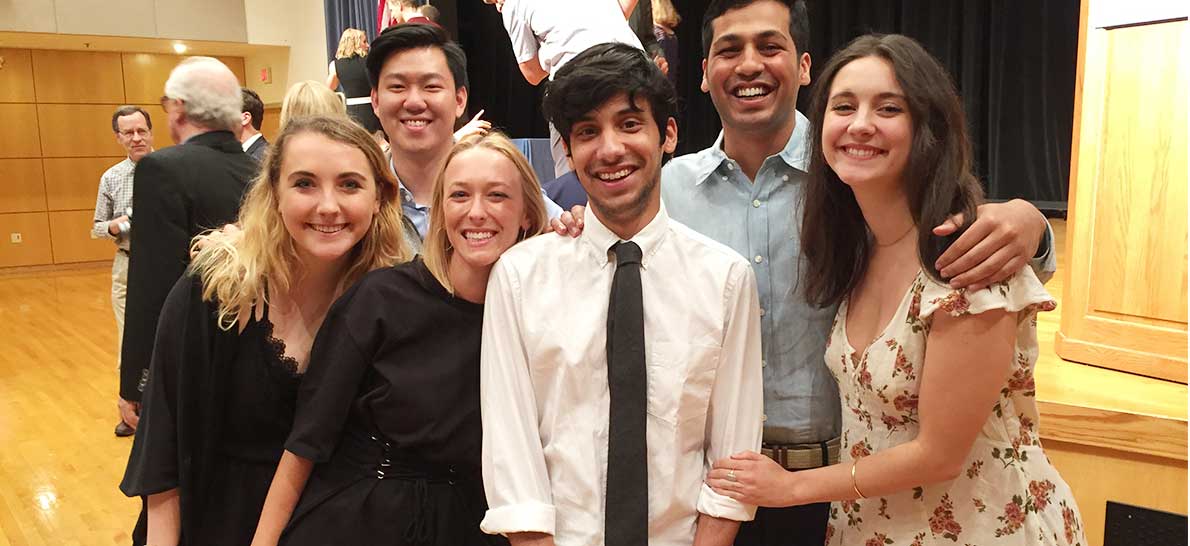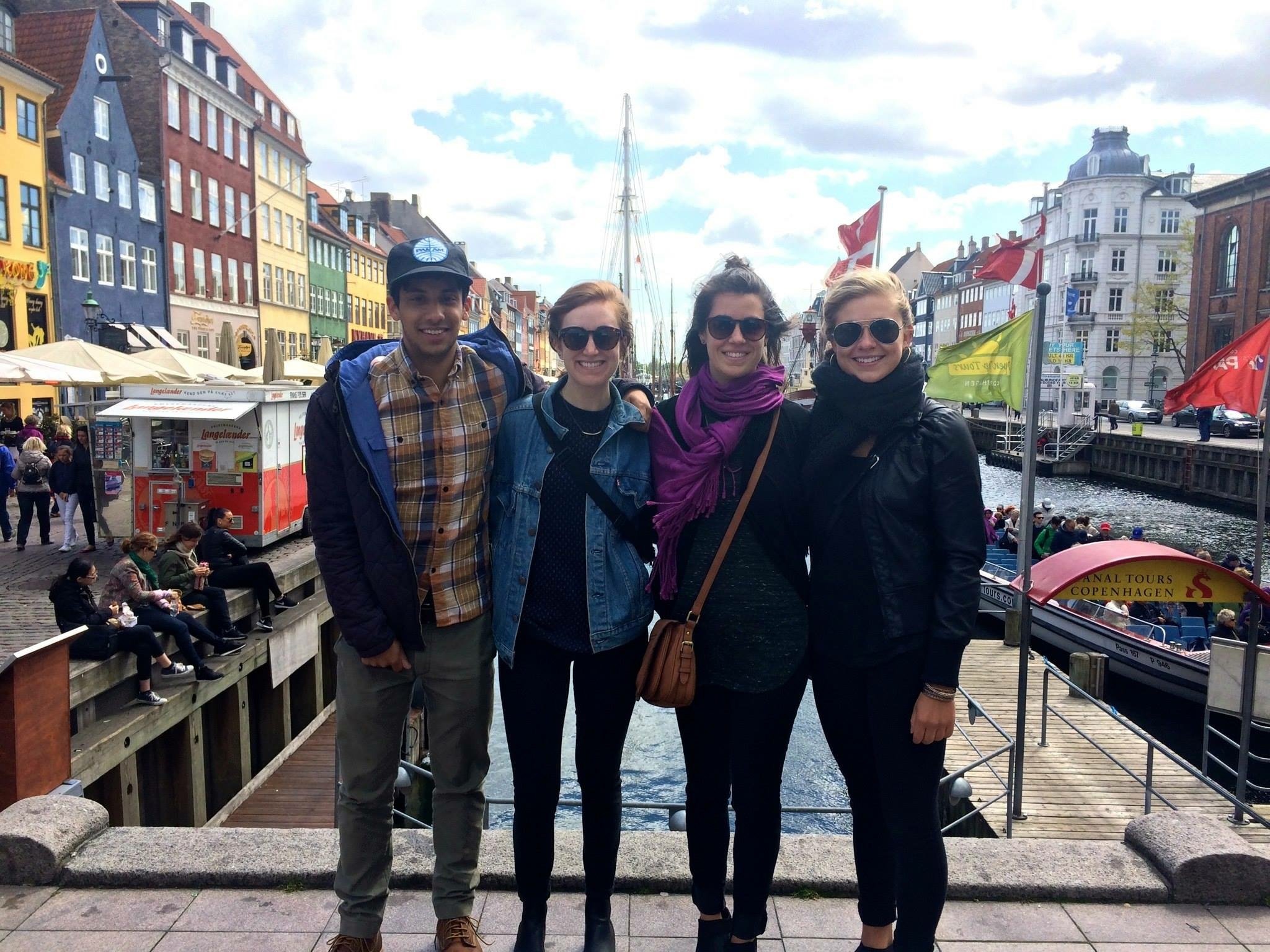Chowdhurys Honor Son’s Memory

NAZURL & TAMMY CHOWDHURY FIND A WAY THROUGH EDUCATION TO HONOR SON AUSTIN’S MEMORY
Approximately 64,000 Americans die every year from a drug overdose.
It’s a statistic that crops up from time to time
on the news networks, or in a special magazine issue, usually quickly followed by more stories about politics or the latest celebrity news. 64,000 people. It’s a horrific number, and too often it’s just a number. Black symbols on a clean white page, but when one of those numbers becomes the name, a face and a life of a loved one the numbers become personal.
On June 9, 2017, Tammy and Nazrul Chowdhury found their 24-year-old son, Austin, dead in his bedroom at their home in Cramer Mountain where they lived for the last 22 years. Four weeks earlier, Austin had received his master’s degree in City and Regional Planning from UNC-Chapel Hill. Aus-
tin died from an overdose of the synthetic opioid FENTANYL, a drug more powerful than any pain pill, even more, powerful than heroin, which was what Austin thought he was taking, and which he had been using for some time, a fact his parents had been unaware of until the day before his death. Today you can order drugs from your own home and have it delivered to you like pizza delivery.
Like most of the opioid users today, Austin’s problems began with a relatively simple dental procedure when he was in high school. The dentist prescribed some pain medication(Hydrocodone) to take if needed after the surgery, and Austin took it for a couple of
It hadn’t.
Tammy, Nazrul, and even Austin didn’t know how addiction works. They didn’t know that Austin’s brain was wired in such a way as to make him predisposed to opioid addiction. They didn’t know that he was that statistical one in every twelve American teens between the ages of 12-17 who would suffer from a substance abuse disorder. They didn’t know that he was an addict waiting to happen. He was just Austin, the incredibly smart guy who loved to play the guitar, who read voraciously, who excelled in school, very social and who loved to travel.
In other words, the Chowdhury’s were like most American families: they really didn’t know anything about addiction. Not how it happens, not how it affects the brain, not how it affects behavior… and they didn’t know what they really needed to do to help the person that they loved so much find the way out. Over time, like many families in the same situation, they were desperately trying to get Austin the help he needed. They took him to counselors, took him to one of the best rehab centers in Charlotte to get evaluated, but they never found the resources they needed to really understand what they were dealing with because those resources weren’t readily availed- able. Nazrul and Tammy firmly believe that, if they had been able to educate themselves about addiction, if they had been able to become informed about how to effectively treat the entirety
of addiction, if they had even realized that addiction is a chronic disease rather than some kind of behavioral condition – then they might well have been able to save their son’s life. All the experts told them Austin was experimenting and it was recreational.
“Addiction doesn’t always present itself like you would think it does,” Tammy says. “Austin was high functioning, so until the last little while,
to look at him, to speak with him, you would never have guessed that he was addicted to opioids.” She thinks that Austin thought he had it under control for a while, and he always told them, convincingly, that he only did drugs recreationally, some weed now and then, and that his days of pills were behind him. “Because he didn’t want to give it up,” Nazrul explains. “You cannot quit on your own, it’s like a love affair with the drug. Your brain wants it so even when you want to stop, you just can’t.”
“It’s not a moral failing,” Tammy says, “it doesn’t mean that you’ve got a bad kid or that you’re a bad parent. It’s a disease.”
“It’s a chronic brain disease,” Nazrul adds, “like diabetes, it’s
not something that you can just take some medicine for and be done with. In this society, we understand how physical illness works, but when it comes to mental illness, we have very little knowledge. This is the biggest issue facing our society right now, and that’s why we are so interested in the educational side of the issue. Without becoming informed, you can’t solve this problem.”
So, they turned their grief into action and educated themselves, and they began to work to educate others so that no one else would have to go through what they had been through. They began working as members of the Education & Prevention Committee with the Gaston Controlled Substances Coalition(GCSC). They are part of Gaston Together, holding community meetings and panel discussions where people can ask questions and get real informed answers. Tammy has spoken to the County Manager’s summit and
The Chowdhury’s are also getting involved with the Dream Center of Gaston County, an after-school and summer education project for promising, but at-risk kids. The program originally founded in Durham, NC, began in Gastonia last year with a select group of sixth graders and will continue adding class groups every year until they have built up a continuous program from sixth grade through grade twelve. The Dream Center reinforces what has been taught in school, they work with the kids addressing areas where they need extra help, educating them about life choices, including addiction, and helps prepare them for college. The Chowdhury’s have founded Austin’s Library at the Dream Center, donating 500 new books in honor of their son and his love of reading.
They have also created the Austin Opioid Edu-cation fund through the community
to support education efforts throughout the community, and work- ing on a program recently to reach out to the ministers of Gaston County’s 700 churches. The Education & Prevention group of GCSC includes city and county officials, medical doctors, first responders, law enforcement, teachers, counselors, and parents.
“We really want parents and kids to understand the realities of addiction,” Nazrul says, “to know that, if you have the predisposition to addiction, then something that others can do occasionally with no harm, and walk away from without difficulty, for you becomes something you feel like you can’t live without, even if you wanted to.”
Nazrul says that “even if you don’t know someone now who
is suffering from addiction now, in the future someone in your family, one of your neighbors or someone in your community could be. There are 100 counties in North Carolina, and Gaston is number four when it comes to the number of opioid overdoses. We must tell people not to judge, we have to treat this like any other disease. No race, religion, age, or socioeconomic status is immune to this. Don’t judge. Get informed and get involved.” You may save a life.
Above all, Tammy says, “if you suspect your child is doing any type of drugs, but especially opioids, pills, or heroin – have Narcan at home. It may take EMS five minutes or more to get to you, and you may not have five minutes to spare, Narcan can buy you that time.”
If you or someone you know is struggling with substance abuse issues, even if they have no insurance or money, there is help available in Gaston County. To talk about your addiction and
get help call Partners Behavioral Health Management at 1-888- 235-HOPE. To learn more about addiction and treatment, visit the Gaston Controlled Substances Coalition website at www. gastoncsc.org, or visit their Facebook page by searching @Gas- tonCSC. Also, you can purchase Narcan at any pharmacy or get it free from NC Herm reduction at 1-828-291-7023, or the Gaston County Opioid Overdose Response Team at 704-453-3760.
Tammy, Nazrul



